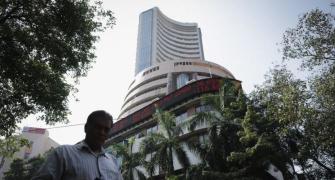In early 2008, at the height of the real estate boom and the bull market, it seemed to make more sense to buy real estate shares than land itself. Between January 2007 and January 2008, land prices appreciated by 150-200 per cent. However, share prices of stocks with real estate exposure did much better.
Housing finance major HDFC saw a price rise of 275 per cent between 2006 and 2008, and developers delivered even better capital gains. The 14-scrip BSE Realty index rose 700 percent between January 2006 and January 2008
Some of the excess returns were the result of creative financial restructuring by real estate developers. Unitech started the trend with a combination bonus-cum-split in 2006 that meant one Unitech share circa April 2006 turned into 65 shares by June 2006. DLF went through a similar, even more complex process that eventually generated a 440:1 split ratio.
By late 2007, Unitech was up around 4,000 per cent in terms of split-adjusted prices, while DLF re-listed at levels that yielded 8,000 per cent returns. By contrast, HDIL, Purvankara, Peninsula, IndiaBulls Real Estate, etc 'only' generated returns in the 500-1000 per cent range.
In the subsequent recession, land prices have fallen between 20 per cent to 50 per cent. But realty stocks corrected much more violently.
By February 2009, the BSE Realty index was down 90 per cent from its highs and many real estate stocks traded lower than they had in January 2006. In the past four months, the realty index has made a spectacular recovery, gaining 170 per cent from its February lows. It is still 70 per cent down from the peak January 2008 levels.
The last two quarters have been terrible for developers. Some are cash-strapped to the point of near-bankruptcy. There has been a drastic drop in sales volumes.
In Q3 and Q4 of 2008-09, net profits shrunk by over 90 per cent in some cases and revenues dropped by more than half. Margins -- the difference between construction costs and sales prices -- came down by anywhere between 30 per cent and 80 per cent.
There have been many stalled projects. SEZs in particular have been shelved for lack of takers. Massive discounts have been offered to get unsold inventory moving.
Almost every real estate major has tried to raise cash. Many have sold equity stakes in private placements and qualified institutional placements. Some have refinanced via long-tenure loans to settle short-term obligations. Commercial real estate developers have tried lease-discounting, trading future rental incomes for current cash advances.
There are some signs of hope.
QIPs are still willing to buy into realty stocks, albeit at big discounts. Anecdotally, there has been some pick-up in residential bookings, especially at the lower end. But commercial and retail segments have been blitzed and supply far exceeds demand. Office rentals and retail (mall) rentals have seen continuous downwards renegotiation.
Real estate corporatised relatively recently with a spate of IPOs between 2004 and 2007. This was also when banks and other financial institutions started offering floating rate mortgages and the retail industry took off. So this is the first full cycle that the industry has ever experienced.
It has become obvious that the sector is very strongly correlated to the macro economy. It has high volatility and therefore, realty shares are high beta. Commercial and retail space sees more violent fluctuations than residential. Therefore, developers with higher residential exposures are slightly more stable.
Analysts have learnt to their cost that next year's sales volumes and margins cannot be predicted by examining this year's numbers because of the exaggerated nature of cycles. Nor can one use the popular NAV metric to value land banks because land prices are mutable. This is quite apart from the location-specific variations in prices.
All this makes the sector difficult to buy and hold for the long-term except for those who have very specialised knowledge. But it is always going to attract traders and speculators who are looking to make a quick buck. That makes real estate an ideal vehicle for traders.
If you're looking to maximise returns during a bull run, buy real estate shares. If you want to short during a bear market, sell real estate stock futures. The exaggerated volatility could work wonders for your portfolio.








